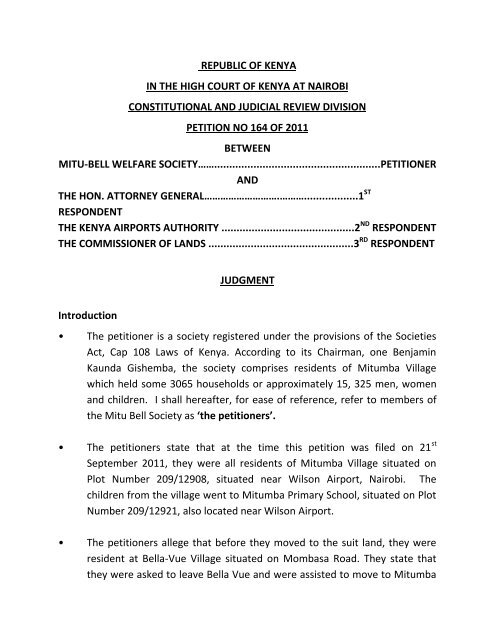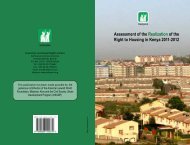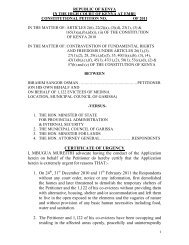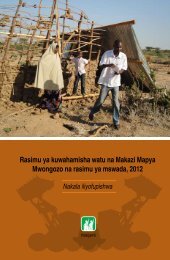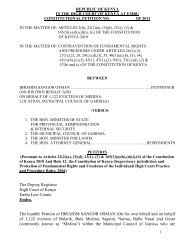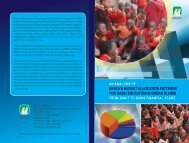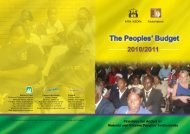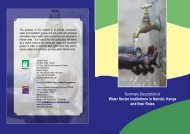Judgment-High Court Petition No 164 of 2011 - Hakijamii
Judgment-High Court Petition No 164 of 2011 - Hakijamii
Judgment-High Court Petition No 164 of 2011 - Hakijamii
Create successful ePaper yourself
Turn your PDF publications into a flip-book with our unique Google optimized e-Paper software.
REPUBLIC OF KENYAIN THE HIGH COURT OF KENYA AT NAIROBICONSTITUTIONAL AND JUDICIAL REVIEW DIVISIONPETITION NO <strong>164</strong> OF <strong>2011</strong>BETWEENMITU-BELL WELFARE SOCIETY…….......................................................PETITIONERANDTHE HON. ATTORNEY GENERAL……………………….………..................1 STRESPONDENTTHE KENYA AIRPORTS AUTHORITY ............................................2 ND RESPONDENTTHE COMMISSIONER OF LANDS ................................................3 RD RESPONDENTJUDGMENTIntroduction• The petitioner is a society registered under the provisions <strong>of</strong> the SocietiesAct, Cap 108 Laws <strong>of</strong> Kenya. According to its Chairman, one BenjaminKaunda Gishemba, the society comprises residents <strong>of</strong> Mitumba Villagewhich held some 3065 households or approximately 15, 325 men, womenand children. I shall hereafter, for ease <strong>of</strong> reference, refer to members <strong>of</strong>the Mitu Bell Society as ‘the petitioners’.• The petitioners state that at the time this petition was filed on 21 stSeptember <strong>2011</strong>, they were all residents <strong>of</strong> Mitumba Village situated onPlot Number 209/12908, situated near Wilson Airport, Nairobi. Thechildren from the village went to Mitumba Primary School, situated on PlotNumber 209/12921, also located near Wilson Airport.• The petitioners allege that before they moved to the suit land, they wereresident at Bella-Vue Village situated on Mombasa Road. They state thatthey were asked to leave Bella Vue and were assisted to move to Mitumba
the Constitution <strong>of</strong> the Republic <strong>of</strong> Kenya and is therefore nulland void.(b) A declaration that any forceful eviction and or demolitionwithout a relocation option is illegal, oppressive andviolates the rights <strong>of</strong> the petitioners.(c) An order restraining any purported demolition and or forcefuleviction by the 2 nd Respondent against the <strong>Petition</strong>ers.(d) A declaration that the resident <strong>of</strong> Mitumba Village are legallyentitled to plot number 209/12921 under file number 226958for Mitumba primary school and plot Number 209/12908under file number 176952 for the village respectively and inthe alternative they are entitled to compensation andreallocation <strong>of</strong> another land or alternative shelter withaccess to education facilities, clean water, health care andfood at the state’s expense.(e) A declaration that the <strong>Petition</strong>ers herein are entitled to thefull protection from discrimination and the same right hasbeen violated and they are entitled to full compensation as aresult <strong>of</strong> loss suffered during and after the illegal demolitionor their structures.(f)A declaration that the <strong>Petition</strong>er’s herein and other members<strong>of</strong> the public are entitled to the full enjoyment <strong>of</strong> the right toeconomic and social rights that are about to be violated andor already violated.(g) Costs <strong>of</strong> this <strong>Petition</strong>.• The Amended <strong>Petition</strong> is supported by the affidavit <strong>of</strong> Benjamin KaundaGishemba sworn on 1 st December <strong>2011</strong> and a further affidavit sworn on 21 st
February 2012. The petitioner also filed written submissions dated 24 thFebruary 2012.The <strong>Petition</strong>ers’ Case• The petitioner’s submitted through their counsel, Mr Kinyanjui, that thispetition was prompted by a notice published in the newspapers by the 2 ndrespondent on 15 th September, <strong>2011</strong>. The notice gave the residents <strong>of</strong>Mitumba village seven (7) days within which to vacate the suit land. Thepetitioners also filed a Chamber Summons application seeking. amongothers, an order in the following terms:'That pending the hearing and determination <strong>of</strong> thisapplication inter partes, a conservatory order be issuedrestraining the 2nd respondent or any <strong>of</strong> them and any state<strong>of</strong>ficer or organ <strong>of</strong> state from carrying on with the process <strong>of</strong>evicting and or demolishing any buildings, installations orerection situate or within the area better described asMitumba village near Wilson Airport.'• Gacheche J granted interim orders on 22 nd September <strong>2011</strong>. However,despite this court order being duly served, the 2 nd respondent went aheadand demolished the petitioners’ houses, the primary school and otherinstitutions in the village. The petitioners state that their household goodsand building materials were all destroyed during the demolition, and theywere left homeless.• The petitioners allege violation <strong>of</strong> their fundamental rights and freedomsguaranteed under the constitution. They contend that by issuing them witha 7 day notice to vacate without giving reasons while knowing that they hadbeen resident on the land for more than 19 years, and then demolishingtheir homes, the 2 nd respondent violated their rights to life, human dignity,security <strong>of</strong> person, freedom <strong>of</strong> movement and residence, social economic
ights, right to property, equality and non-discrimination and fairadministrative action as guaranteed under Articles 26, 27, 28, 29, 39, 40, 43and 47 <strong>of</strong> the Constitution. They contend that since they had lived on theland for more than 19 years, it was unreasonable and unconstitutional forthe respondents to give them 7 days’ notice to move out <strong>of</strong> their homeswithout affording them any reasons. They relied on the decision <strong>of</strong> the<strong>High</strong> <strong>Court</strong> sitting in Embu in Ibrahim Sangor Osman –vs- Minister <strong>of</strong> Statefor Provincial Administration and Internal Security & 3 Others, Embu HCCC<strong>No</strong>. 2 <strong>of</strong> <strong>2011</strong> where Muchelule J held that a 21-day notice to vacate issuedto people who had lived on the suit land since 1940 was insufficient andunreasonable.• They contend that since the 2 nd respondent failed to give reasons in thenotice requiring them to vacate, the demolitions were in total disregard <strong>of</strong>the law, particularly with regard to the right to adequate housing, and thatit was also carried out in disregard <strong>of</strong> international prohibitions againstforced evictions contained in Article 11 <strong>of</strong> the International Covenant onEconomic, Social and Cultural Rights.• The petitioners acknowledge that the 2 nd respondent is mandated toadminister, control and manage aerodromes and any other property vestedin it. However, they asked the court to be guided by the case <strong>of</strong> SusanWaithera Kariuki & 4 Others –vs- Town Clerk, Nairobi City Council & 2Others, <strong>Petition</strong> <strong>No</strong>. 66 <strong>of</strong> 2006 where the <strong>Court</strong>, while recognising theduty <strong>of</strong> the City Council <strong>of</strong> Nairobi to plan the city, held that it was alsounder a duty to respect the constitutional rights <strong>of</strong> people.• They allege, however, that the suit land does not belong to the 2 ndrespondent, and if it did, its right to the land had been extinguished and thepetitioners were entitled to the land by virtue <strong>of</strong> the doctrine <strong>of</strong> adversepossession as they had lived on the land for well over 19 years. They assertthat contrary to claims by the 2 nd respondent, their village was not on theflight path, and that even if it was, the acts <strong>of</strong> the 2 nd respondent were
discriminatory as there are other, multi-storied structures around theairport that were not demolished.• The petitioners allege further that the 2 nd respondent did not consult withthem before carrying out the demolition, and that it treated them in aninhumane and degrading manner. They allege that they were subjected tobrutality and physical violence by the police who evicted them, and thatpolice dogs were released on them as they tried to re-construct theirdemolished structures. They therefore claim that their right to be treatedwith dignity guaranteed by Article 28 <strong>of</strong> the Constitution was violated; thatit was unconstitutional for the respondents to evict such a large number <strong>of</strong>people from their dwellings where they have lived for many years andrender them homeless, and that the government has an obligation toprovide them with alternative housing, which it had failed to do.• They have relied on the provisions <strong>of</strong> the Universal Declaration <strong>of</strong> HumanRights and Article 21(2) <strong>of</strong> the African Charter on Human and People'sRights which provide that in case <strong>of</strong> eviction, the dispossessed people shallhave the right to the lawful recovery <strong>of</strong> their property, restoration to theiroriginal situation as well as to an adequate compensation. They claim thatthey are entitled to compensation and relocation to another parcel <strong>of</strong> landor alternative shelter with access to educational facilities, clean water,health care and food at the state's expenses. They rely in this regard on thedecision <strong>of</strong> Muchelule J, in Ibrahim Sangor Osman –vs- Minister For Statefor Provincial Administration and Internal Security & 3 Others (supra) inwhich he ordered the respondents to pay each <strong>of</strong> the 1,123 petitioners inthat case Kshs 200,000, return them to the land they were evicted from,and construct houses for them.• The petitioners also allege violation <strong>of</strong> the rights <strong>of</strong> children guaranteedunder the Constitution and international law. They claim that the forcible,violent and brutal eviction through demolition <strong>of</strong> their homes withoutaccording their children alternative shelter or accommodation and leaving
them exposed to the vagaries <strong>of</strong> nature is a violation <strong>of</strong> the children rightsto basic nutrition, shelter, health care, and education, among others,guaranteed by Article 21(3) and 53 <strong>of</strong> the Constitution.The 1 st and 3 rd Respondents’ Case• The 1 st & 3 rd respondent’s case was presented by Mr Ojwang, LitigationCounsel, who relied on the grounds <strong>of</strong> opposition dated 15 th <strong>No</strong>vember<strong>2011</strong> and undated submissions filed on 27 th April 2012. The position takenby the 1 st and 3 rd respondents is that as the petitioners have failed toprovide any evidence <strong>of</strong> their ownership <strong>of</strong> the suit land, they cannot claimviolation <strong>of</strong> the right to property. Further, as the land belongs to the 2 ndrespondent which is a state entity, the doctrine <strong>of</strong> adverse possessioncannot apply.• The respondents argue that the basis <strong>of</strong> the petitioners’ claim is socialeconomic rights, which rights are progressive in nature and are limited asprovided under Article 25 <strong>of</strong> the Constitution; that the enjoyment <strong>of</strong> theserights and freedoms by any individual, including the petitioners, should notprejudice the rights and freedoms <strong>of</strong> others. Consequently, they take theview that the 3 rd respondent has acted in accordance with the law byprotecting the interests <strong>of</strong> property owners and not allocating to thepetitioners what has already been allocated to another party. They contendalso that there was nothing before the court to demonstrate any violation<strong>of</strong> the petitioners’ constitutional rights as alleged, and that the petitionershad failed to raise any constitutional issue for the court to determine.They referred the court to the decision in Rashid Odhiambo Aloggoh and245 Others –vs- Haco Industries Misc. Appli. 1520 <strong>of</strong> 1999 where the courtheld that any applicant who alleges that his rights have been infringed muststate clearly with supporting facts and instances where such rights havebeen infringed.• The respondents also submit that the petitioners are guilty <strong>of</strong> material nondisclosureas they have failed to disclose that they encroached on the 2 nd
espondent’s land. They urged the court to dismiss the petition for nondisclosure<strong>of</strong> material facts and relied in this regard on the decision inKenya Bus Services Limited –vs- Attorney General and Others Misc. CivilApplication <strong>No</strong>. 413 <strong>of</strong> 2005 where it was held that non-disclosure <strong>of</strong>material facts is sufficient to warrant the dismissal <strong>of</strong> a constitutionalapplication.The 2 nd Respondent’s Case• The 2 nd respondent also opposes the Amended <strong>Petition</strong>, but did not file anydocuments directly in answer to either the <strong>Petition</strong> or the Amended<strong>Petition</strong>. In its written submissions which appear to be erroneously dated15 th March <strong>2011</strong> but were filed in court on 16 th March 2012, the 2 ndrespondent states that it relies on two affidavits. The first was sworn by MsJoy Nyaga, the 2 nd respondent’s Acting Corporation Secretary, on 26 thOctober <strong>2011</strong>, while a Further Affidavit was sworn by the 2 nd respondent’sManaging Director, Eng. Stephen Gichuki, on 9 th February 2012. Ms Nyaga’saffidavit is expressed to be in opposition to the application for conservatoryorders dated 21 st September <strong>2011</strong> while the affidavit sworn by Eng.Stephen Gichuki, on 9 th February 2012 is in response to the petitioners’application dated 17 th January 2012 seeking orders <strong>of</strong> contempt against theManaging Director for disobedience <strong>of</strong> the court order issued on 22 ndSeptember <strong>2011</strong>. <strong>No</strong>netheless, I will consider these two affidavits ascontaining the 2 nd respondent’s answer to the petitioners’ claim.• While conceding that eviction <strong>of</strong> the petitioners and demolition <strong>of</strong> theirhouses did take place as alleged, the 2 nd respondent takes two approachesin its defence. It contends, first, that since the land the subject <strong>of</strong> thisdispute belongs to it, there has been no violation <strong>of</strong> the petitioners’ right toproperty under Article 40 <strong>of</strong> the Constitution. It contends, however, andthis is the gist <strong>of</strong> the affidavit by Eng. Stephen Gichuki, that it did not carryout the demolitions which it claims were carried out by state and securityagents as the settlement posed a security threat due to the war in Somalia.
• Mr Mutua for the 2 nd respondent questioned the justiciability <strong>of</strong> socialeconomic rights. He submitted that such rights are second and thirdgeneration rights which impose a duty on the state to do certain things toguarantee the protection <strong>of</strong> these rights. Therefore, even if these rights arejusticiable, a balance has to be struck, and the court must strive to addressthe question <strong>of</strong> availability <strong>of</strong> funds from the executive for theirenforcement. The 2 nd respondent relied on the decision <strong>of</strong> the Supreme<strong>Court</strong> <strong>of</strong> India in Olga Tellis –vs- Bombay Municipal Corporation (1985)Supp SCR 51 where it was held that the respondent was justified indirecting the removal <strong>of</strong> the petitioners who had encroached on pavementsand footpaths. It also relied on the case <strong>of</strong> Thiagray Soobramoney –vs-Minister <strong>of</strong> Health (Kwa-Zulu Natal) 9188 (1) SA 765 and submitted that inthat decision, the Constitutional <strong>Court</strong> <strong>of</strong> South Africa stated that one <strong>of</strong> thelimiting factors to the attainment <strong>of</strong> the constitutional guarantee to socialeconomic rights is that <strong>of</strong> limited resources. Mr. Mutua also referred thecourt to the decision <strong>of</strong> the Constitutional <strong>Court</strong> <strong>of</strong> South Africa in IreneGrootboom and Others v The Government <strong>of</strong> the Republic <strong>of</strong> South Africaand Others (2001) (1) SA 46 in which the court held that section 26 and 28<strong>of</strong> the Constitution <strong>of</strong> South Africa do not entitle the petitioners to claimshelter or housing immediately upon demand. Similarly, the petitionerswere not entitled to claim social economic rights two years after thepromulgation <strong>of</strong> the Constitution.Determination• The basic facts that gave rise to this petition are undisputed. Thepetitioners were all resident in the informal settlement known as MitumbaVillage, which was situated near Wilson Airport, Nairobi. On 15 thSeptember, <strong>2011</strong>, the 2 nd respondent issued a notice to residents <strong>of</strong> thevillage, among others who had allegedly encroached on its land, to vacatewithin 7 days. The notice was signed by the Managing Director <strong>of</strong> the 2 ndrespondent.
• About one week after the notice, the petitioners filed this petition, and on22 nd September <strong>2011</strong>, the court granted an order restraining the eviction <strong>of</strong>the petitioners or demolition <strong>of</strong> their houses pending inter partes hearing<strong>of</strong> their application. However, in total disregard <strong>of</strong> the court order, theevictions and demolitions were carried out on 19 th <strong>No</strong>vember <strong>2011</strong> and onat least one other occasion thereafter.• The 2 nd respondent contends that it did not carry out the demolitions, thatthe eviction and demolitions were carried out by the executive. Apart fromthe mention by the petitioners that police dogs were unleashed on themduring the demolitions, thus suggesting police presence, there is noevidence that supports the involvement <strong>of</strong> any other state agency in thedemolition. At any rate, the notice to vacate was issued by the 2 ndrespondent, which claims ownership <strong>of</strong> the land. The 2 nd respondent is astate corporation. Consequently, whether the demolitions were carried outby the 2 nd respondent alone, or with other state agents, what emerges isthat the state or its agents demolished the petitioners’ homes and evictedthem from the land. The 1 st and 2 nd respondents are therefore, in my view,responsible for the evictions and demolition <strong>of</strong> Mitumba village.• Before going any further in considering the merits <strong>of</strong> the petitioners’case, it is important to point out that the eviction <strong>of</strong> the petitioners anddemolition <strong>of</strong> their homes during the pendency <strong>of</strong> an order <strong>of</strong> the courtwent against all the tenets <strong>of</strong> the Constitution. This court did find on 13 thJune 2012 that the 2 nd respondent, as the party which had issued the noticeto vacate and which alleged ownership <strong>of</strong> the land, was in contempt <strong>of</strong> theorder <strong>of</strong> the court, a finding that is now the subject <strong>of</strong> an appeal.• <strong>No</strong>netheless, it is worth observing that the Constitution vests, at Article159, judicial authority in the judiciary. It also vests in the <strong>High</strong> <strong>Court</strong>, underArticle 165(3) (b), the jurisdiction to determine whether a right orfundamental freedom has been denied, infringed, violated or threatenedwith violation. At Article 22, the Constitution grants to every person the
elong to the petitioners but to the 2 nd respondent; that the 2 nd respondentwas under an obligation, in performing its statutory duty under the CivilAviation Act, to ensure air safety by removing the informal settlementwhich was on a flight path; that the demolitions was not carried out by the2 nd respondent but by the state in order to remove the threat posed by thevillage given the ongoing war in Somalia; and that the petitioners areclaiming social economic rights which are progressive and cannot begranted at once.• In determining this matter, and taking into account the respectivearguments <strong>of</strong> the parties set out above, I believe I am called upon toaddress my mind to three main issues:• What rights, if any, do the petitioners have over thesubject property?• If the answer to i) above is in the negative, was theireviction and the demolition <strong>of</strong> their houses a Violation <strong>of</strong>their Rights under the Constitution?• If the answer to ii) above is in the positive, what reliefshould the court grant to the petitioners?• Rights over the Subject Property• The petitioners allege violation <strong>of</strong> their right under Article 40, whichprovides as follows:40. (1) Subject to Article 65, every person has the right, eitherindividually or in association with others, to acquire and ownproperty––(a) <strong>of</strong> any description; and(b) in any part <strong>of</strong> Kenya.
• The respondents have submitted that there has been no violation <strong>of</strong> thepetitioners’ right to property as the petitioners have no right to the land inquestion, and that they have not produced any documentary evidence toshow that they own the land or that it was allocated to them by the thenNairobi Provincial Commissioner. They maintain that the land belongs tothe 2 nd respondent and could therefore not be allocated to the petitioners.On their part, the petitioners claim that they were allocated the land, but inthe alternative, since they have lived on the land for over 19 years, it vestedin them by virtue <strong>of</strong> the doctrine <strong>of</strong> adverse possession.Adverse Possession• This latter claim is easily disposed <strong>of</strong> in light <strong>of</strong> statutory provisions withregard to acquisition <strong>of</strong> title to land by way <strong>of</strong> adverse possession. Section41(a)(i) <strong>of</strong> the Limitation <strong>of</strong> Actions Act (Cap 22) provides that:'This Act does not-(a) Enable a person to acquire any title to, or anyeasement over-(i) Government land or land otherwise enjoyed by thegovernment'.• The law that one cannot maintain a claim to government or public land byway <strong>of</strong> adverse possession is also well articulated in our jurisdiction. SeePeter Mwashi & Anor -vs- Javan Mwashi & Others, Eldoret HCC 38 OF2004 and Beatrice Syokau -vs- Kenya Airports Authority & Another<strong>Petition</strong> <strong>No</strong> 1 <strong>of</strong> 2012. The 2 nd respondent is a state corporationestablished under section 3(1) <strong>of</strong> the Kenya Airports Authority Act, Chapter395 <strong>of</strong> the Laws <strong>of</strong> Kenya. It is not possible therefore for the petitioners tomaintain a claim in adverse possession over its land in light <strong>of</strong> the abovestatutory provisions.Allocation
• The petitioners have also laid a claim on the land on the basis that it wasallocated to them in 1992 by the then Provincial Commissioner <strong>of</strong> Nairobi,Mr Fred Waiganjo. There is no document in support <strong>of</strong> the allegedallocation in 1992 but the petitioners have adduced in evidence letterswhich they wrote to the 3 rd respondent seeking allocation <strong>of</strong> the land tothem. These include a letter dated 2 nd June 2004, 18 th June 2008, 28 thJanuary 2009, and 10 th February 2009. There is no response from the 3 rdrespondent to these letters, and there is also no evidence that the land wasever allocated to the petitioners. In any event, under the law then in forceas provided in the Government Lands Act, Cap 281 <strong>of</strong> the Laws <strong>of</strong> Kenya(now repealed), the Provincial Commissioner had no authority in law toallocate land.• Title in the land, therefore, appears to be vested in the 2 nd respondent,although the petitioners aver, and documents before the court suggest,that there may have been allocation <strong>of</strong> this land to private individuals. Thisissue is not, however, falling for determination in this matter nor is this theappropriate forum for dealing with any such alleged allocation. Suffice tosay that there is nothing before me to support the petitioners’ claim thatthey have a legal basis for alleging ownership <strong>of</strong> the land. Consequently, Ifind that the petitioners have no legitimate claim to the land, and cannottherefore maintain a claim for violation <strong>of</strong> their right to property underArticle 40 in respect <strong>of</strong> the land.• Whether the Eviction Was in Violation <strong>of</strong> the <strong>Petition</strong>ers’ ConstitutionalRights• The question, however, is whether, even if the land belongs to the 2 ndrespondent and the petitioners had unlawfully encroached on it, the 2 ndrespondent, or indeed any person or organ <strong>of</strong> state, was entitled to removethe petitioners in the manner in which they were removed. If the manner <strong>of</strong>removal was unlawful, did it amount to a violation <strong>of</strong> the petitioners’ rightsunder the Constitution?
pertinent in relation to a matter such as forced evictionswhich directly invokes a large number <strong>of</strong> rights recognized inboth the international covenant on human rights. Thecommittee considers that the procedural protections whichshould be applied in relation to forced evictions include:(a) an opportunity for genuine consultation with thoseaffected;(b)(c)adequate and reasonable notice for all affected personsprior to the scheduled date <strong>of</strong> eviction;information on the proposed evictions, and, whereapplicable, on the alternative purpose for which theland or housing is to be used, to be made available inreasonable time to all those affected;(d) especially where groups <strong>of</strong> people are involved,government <strong>of</strong>ficials or their representatives to bepresent during an eviction;(e)(f)(g)(h)all persons carrying out the eviction to be properlyidentified;evictions not to take place in particularly bad weatheror at night unless the affected persons consentotherwise;provision <strong>of</strong> legal remedies; andprovision, where possible, <strong>of</strong> legal aid to persons whoare in need <strong>of</strong> it to seek redress from the courts.•Evictions should not result in individuals being renderedhomeless or vulnerable to the violation <strong>of</strong> other humanrights. Where those affected are unable to provide forthemselves, the State party must take all reasonablemeasures, to the maximum <strong>of</strong> its available resources, toensure that adequate alternative housing, resettlement or
access to productive land, as the case may be is available.”(Emphasis added)• The <strong>High</strong> <strong>Court</strong> in Kenya had occasion to consider the issue <strong>of</strong> evictions andthe lack <strong>of</strong> appropriate legal mechanisms to govern evictions in the case <strong>of</strong>Satrose Ayuma & 11 Others -vs- Registered Trustees <strong>of</strong> the KenyaRailways Staff Retirement Benefit Scheme & 2 Others <strong>Petition</strong> <strong>No</strong>. 65 <strong>of</strong>2010. In granting an injunction restraining the eviction <strong>of</strong> the petitioners inthat matter, the court noted with concern the lack <strong>of</strong> legal guidelinesgoverning evictions in Kenya, whether such intended evictions are fromformal or informal settlements. Justice Musinga stated as follows in hisjudgment:‘At some particular point in time the tenants will have to moveout <strong>of</strong> the estate but when that time comes, that ought to be donein a humane manner. The challenge <strong>of</strong> providing accessible andadequate housing as required under Article 43(b) <strong>of</strong> theConstitution is all evident. The problem <strong>of</strong> informal settlements inurban areas cannot be wished away, it is here with us. There istherefore need to address the issue <strong>of</strong> forced evictions anddevelop clear policy and legal guidelines relating thereto.’(Emphasis added)• In the case <strong>of</strong> Susan Waithera Kariuki & 4 Others –vs- Town Clerk NairobiCity Council & 2 Others <strong>Petition</strong> <strong>No</strong>. 66 <strong>of</strong> <strong>2011</strong>, Justice Musinga was againconfronted with the issue <strong>of</strong> eviction <strong>of</strong> residents <strong>of</strong> an informal settlementin Nairobi. While holding that the eviction <strong>of</strong> the residents from theirhomes in the settlement would be in violation <strong>of</strong> the petitioners' right tohousing, he observed as follows:'While I agree that the 1 st respondent has a duty to controldevelopments in the city <strong>of</strong> Nairobi as required under theLocal Government Act as well as the Physical Planning Act,
the protection <strong>of</strong> the petitioner's fundamental right asguaranteed under the constitution overrides the aforesaidduty and responsibility <strong>of</strong> the 1st respondent. The petitionershave resided on the properties where they are being evictedfrom for many years. It is unreasonable and indeedunconstitutional for the respondents to give the petitionersone or two day notice to move out <strong>of</strong> their respective homeseven without giving them any reason there<strong>of</strong> andimmediately upon expiry <strong>of</strong> the short notice embark onforceful eviction and demolition <strong>of</strong> their homes. Thepetitioners ought to be treated with dignity as required by ourconstitution. It is unconstitutional to forcefully evict such alarge number <strong>of</strong> people from dwellings where they have livedfor more than forty years and render them homelessovernight. The government has a constitution obligation toprovide them alternative housing....even though it isimportant that the 1st respondent plans the City <strong>of</strong> Nairobiproperly, and that may entail having to evict some peoplefrom informal settlements and on road reserves for purposes<strong>of</strong> road expansion and or beautification, the constitutionrights <strong>of</strong> those people must be respected and given dueconsideration'.• Similarly, in Ibrahim Sangor Osman & Another –vs- Minister for State forProvincial Administration & Another (Supra), the court held that a noticeto vacate within 21 days issued to the petitioners in that case wasunreasonable, and the subsequent evictions were a violation <strong>of</strong> the rights<strong>of</strong> the petitioners to accessible and adequate housing under theConstitution.• I agree fully with the sentiments <strong>of</strong> the court in the above matters. It isunreasonable, unconscionable and unconstitutional to give persons in theposition <strong>of</strong> the petitioners seven days’ notice within which to vacate their
homes, and then demolish their homes without giving them alternativeaccommodation. It exacerbates the violation when the eviction is carriedout, as in this case, even after those affected have sought and obtained theintervention <strong>of</strong> the court. I therefore find and hold that the eviction <strong>of</strong> thepetitioners from Mitumba Village after a 7 day notice was unreasonable.• I now turn to consider whether, as claimed by the petitioners, the evictionand demolition resulted in violation <strong>of</strong> their rights under the Constitution.Violation <strong>of</strong> the Right to Property under Article 40• As indicated above, the petitioners’ claim to ownership <strong>of</strong> the land, eitherby way <strong>of</strong> adverse possession or through allocation by the ProvincialCommissioner, cannot be maintained. However, the protection <strong>of</strong> propertyunder Article 40 <strong>of</strong> the Constitution which is set out above extends to otherproperty besides land. This is because Article 260 <strong>of</strong> the Constitutiondefines property as follows:“property” includes any vested or contingent right to, orinterest in or arising from—(a) land, or permanent fixtures on, or improvements to, land;(b) goods or personal property;(c) intellectual property; or(d) money, choses in action or negotiable instruments;• The constitutional right to property thus extends to, and must thereforeinclude protection <strong>of</strong>, goods and personal property. The petitioners claimthat in the eviction from the premises, their houses and household goodswere destroyed, the 2 nd respondent did not give them an opportunity tosalvage any <strong>of</strong> their goods, and they were left destitute.
• The petitioners have not given particulars <strong>of</strong> which <strong>of</strong> their goods weredestroyed during the eviction, but it must inevitably follow that such goodsas the petitioners had in their dwellings, and the materials the houses weremade <strong>of</strong>, were destroyed during the demolition. <strong>No</strong>t only did therespondents violate the petitioners’ right to housing by evicting them fromthe subject property and destroying their dwellings, but they also violatedtheir right by the violent nature <strong>of</strong> the eviction and demolition, and theunleashing <strong>of</strong> police dogs, thereby denying the petitioners a chance tosalvage any <strong>of</strong> their personal and household goods.Violation <strong>of</strong> the Right to Housing and Other Social Economic Rights• Article 43 <strong>of</strong> the Constitution contains the constitutional guarantee to socialeconomic rights. The relevant provision <strong>of</strong> this Article for our purposes is asfollows:43. (1) Every person has the right—(a) ….(b) to accessible and adequate housing, and to reasonablestandards <strong>of</strong> sanitation;• The 2 nd respondent has contended that the claim by the petitioners is forsocial and economic rights, which are second generation and progressive innature and should therefore not be claimed two years after thepromulgation <strong>of</strong> the Constitution.• Such an argument fails to recognise the essential connection, interdependenceand indivisibility <strong>of</strong> rights and more importantly, is made inignorance <strong>of</strong> the fact that the classification <strong>of</strong> rights as first or secondgeneration has long been abandoned, and the indivisibility andinterdependence <strong>of</strong> human rights recognized. Paragraph 5 <strong>of</strong> the 1993Vienna Declaration and Programme <strong>of</strong> Actions adopted by the WorldConference on Human Rights on 25 th June 1993 states that:
‘All human rights are universal, indivisible and interdependentand interrelated.’• With regard to the justiciability <strong>of</strong> social economic rights which the 2 ndrespondent also challenges, I can do no better than to quote GeneralComment <strong>No</strong>. 9 on the Domestic Application <strong>of</strong> the InternationalCovenant on Economic, Social and Cultural Rights, CESCR, GeneralComment 9, The Domestic Application <strong>of</strong> the Covenant (Nineteenthsession, 1998), U.N. Doc.E/C.12/1998/24 (1998), para. 10 in which theCommittee on Economic, Social and Cultural Rights (CESCR) states asfollows:‘The adoption <strong>of</strong> a rigid classification <strong>of</strong> economic, social andcultural rights which puts them, by definition, beyond the reach<strong>of</strong> the courts would thus be arbitrary and incompatible withthe principle that the two sets <strong>of</strong> human rights are indivisibleand interdependent. It would also drastically curtail thecapacity <strong>of</strong> the courts to protect the rights <strong>of</strong> the mostvulnerable and disadvantaged groups in society.’• The argument that social economic rights cannot be claimed at this point,two years after the promulgation <strong>of</strong> the Constitution, also ignores the factthat no provision <strong>of</strong> the Constitution is intended to wait until the state feelsit is ready to meet its constitutional obligations. Article 21 and 43 requirethat there should be ‘progressive realization’ <strong>of</strong> social economic rights,implying that the state must begin to take steps, and I might add be seen totake steps, towards realization <strong>of</strong> these rights.• Consequently, when the state or a state agency such as the 2 nd respondentdemolishes the homes <strong>of</strong> poor citizens such as the petitioners who live ininformal settlements such as Mitumba village, when it does so after a sevenday notice, without giving them alternative accommodation, it violates not
only the rights <strong>of</strong> the petitioners but the Constitution itself and theobligations that it imposes on the state, both at Article 21 and 43, but alsoin the national values and principles <strong>of</strong> governance set out in Article 10which include ‘(b) human dignity, equity, social justice, inclusiveness,equality, human rights, non-discrimination and protection <strong>of</strong> themarginalized.’• Article 43 <strong>of</strong> the Constitution imposes on the state a positive obligation toensure access by its citizens to social economic rights, and as therespondents rightly argue, access to these rights is progressive, and isdependent on the availability <strong>of</strong> resources. However, Article 21(1) <strong>of</strong> theConstitution provides that:‘It is a fundamental duty <strong>of</strong> the State and every state organ toobserve, respect, protect, promote and fulfil the rights andfundamental freedoms in the Bill <strong>of</strong> Rights'.• There is thus an obligation on the state to 'observe, respect, protect,promote and fulfil’ socio-economic rights and in particular, the right toadequate and accessible housing. The duty to respect implies that the statehas a duty to refrain from interfering directly or indirectly with theenjoyment <strong>of</strong> the right. In other words, the state not only has a positiveduty to fulfil the rights guaranteed under Article 43 by taking positive stepsto ensure access by citizens, but it also has a negative obligation not to doanything that impairs the enjoyment <strong>of</strong> these rights. Thus, with regard tothe right to housing, it is violated when evictions and demolitions, as in thecurrent case, are carried out, leaving citizens homeless. In the IreneGrootboom case relied on by the 2 nd respondent, the Constitutional <strong>Court</strong>observed, in its analysis <strong>of</strong> section 26 <strong>of</strong> the Constitution <strong>of</strong> South Africa,which is similar to our Article 43, that:‘Although the subsection does not expressly say so, there is, atthe very least, a negative obligation placed upon the state and
all other entities and persons to desist from preventing orimpairing the right <strong>of</strong> access to adequate housing.’• In the present case, the state had an obligation to protect the petitioners’existing homes, rudimentary as they were, while doing what it could, to theextent <strong>of</strong> its available resources, to ensure their progressive access toadequate housing. It cannot properly argue, as it has in this case, that sincethe petitioners had no right to the land, their houses in Mitumba Villagecould be demolished arbitrarily without providing them with alternativeaccommodation. The state has an obligation to ‘observe, respect, protect,promote and fulfil’ the petitioners’ right to adequate housing, and theactions by the 2 nd respondent in this case was unlawful andunconstitutional.Violation <strong>of</strong> Civil and Political Rights• The petitioners have also alleged violation <strong>of</strong> their rights under Articles 26,27, 28, 29 and 47 <strong>of</strong> the Constitution, while the respondents argue thatviolation <strong>of</strong> these rights has not been made out. The Constitutionguarantees to all citizens, at Article 26, the right to life, Article 27 containsthe non-discrimination provisions and guarantees to everyone equalprotection and benefit <strong>of</strong> the law, while Article 28 recognises the inherentdignity <strong>of</strong> all and guarantees to all the right to have that dignity respected.At Article 29, the right <strong>of</strong> everyone to security <strong>of</strong> the person and to freedomfrom violence from either private or public sources is guaranteed. Article47 contains the constitutional guarantee to fair administrative action.• In my view, enjoyment <strong>of</strong> these rights, which the 2 nd respondent would liketo see in the now discarded division <strong>of</strong> rights as first and second generation,is not possible without the social economic rights which our Constitutionguarantees at Article 43. A failure by the state to ensure that citizens haveaccess to the rights guaranteed by Article 43 directly impacts on the ability
<strong>of</strong> citizens to enjoy all the other rights set out in the Constitution. Thedeliberate state or state agency action to deprive the petitioners <strong>of</strong> thehousing that they had provided for themselves, through self- help means,and in the face <strong>of</strong> state failure to meet its constitutional obligation toprovide them with adequate housing, manifests a callous disregard for allthe petitioners’ right: it leaves them without a home, a means <strong>of</strong> livelihood;it robs them <strong>of</strong> their dignity, jeopardizes their right to health, and threatenstheir right to life.Constitutional Requirement for Consultation and Participation• The 2 nd respondent has justified the eviction and demolition <strong>of</strong> thepetitioners’ homes on two grounds. It avers, first, that the petitioners’village was stationed on a flight path as it was situated near Wilson Airport,and it was therefore necessary for it to be demolished. In the affidavit <strong>of</strong>Eng. Stephen Gichuki, the 2 nd respondent contends that it did not carry outthe demolitions; that they were carried out by the executive branch <strong>of</strong>government because <strong>of</strong> the security threat posed by the village due to theon-going war in Somalia.• The court recognises that there may be instances when eviction <strong>of</strong> peoplemay be necessary, and that considerations <strong>of</strong> national security may be onereason for such evictions. It is, however, recognised that even in suchinstances, there is a need to follow due process: that those to be affectedshould be given notice, and that there should be consultation andparticipation <strong>of</strong> those to be affected by the removal process. The 2 ndrespondent has relied on the case <strong>of</strong> Olga Tellis & Others v BombayMunicipal Corporation (supra) to support its contention that the removal<strong>of</strong> the petitioners was justifiable. However, while the court in that caseallowed the evictions <strong>of</strong> the pavement dwellers to proceed, it did recognisetheir right to be heard, and that a process that did not allow this wouldviolate the right to shelter and a livelihood:
'It is therefore essential that the procedure prescribed by lawfor depriving a person <strong>of</strong> his fundamental right, must conformto the means <strong>of</strong> justice and fair play. Procedure which is unjustor unfair in the circumstances <strong>of</strong> a case, attracts the vice <strong>of</strong>unreasonableness, thereby vitiating the law which prescribesthat procedure and consequently, the action taken under it.Any action taken by a public authority which is invested withstatutory powers has, therefore, to be tested by the application<strong>of</strong> two standards; the action must be within the scope <strong>of</strong> theauthority conferred by law and secondly, it must bereasonable.’• In our jurisdiction, Justice Musinga observed in Susan Waithera -vs- cityCouncil <strong>of</strong> Nairobi (supra), that performance <strong>of</strong> a statutory duty cannotexcuse violation <strong>of</strong> citizens’ constitutional rights.• It is regrettable that there is yet to be enacted legislation that governsevictions. However, even without such legislation, there are sufficientguidelines provided by the Constitution and international law which thestate, in line with its constitutional obligation and as a signatory tointernational covenants, should follow. The principle <strong>of</strong> consultation andparticipation <strong>of</strong> the people is entrenched in the Constitution in the nationalvalues and principles; Article 47 requires fair administrative action, whichencompasses the notion <strong>of</strong> notice, consultation and a right to be heardbefore adverse action is taken. More directly and explicitly, as I haveindicated above, the United Nations Office <strong>of</strong> the <strong>High</strong> Commissioner forHuman Rights guidelines, incorporated into our law by Article 2(5) and (6)<strong>of</strong> the Constitution, provide a clear benchmark for states to follow indealing with persons who, for whatever reason, including considerations <strong>of</strong>security, have to be removed from land that they have been living on.
• With such clear constitutional and international law guidelines on howpersons in the position <strong>of</strong> the petitioners should be dealt with, there cannotbe, in my view, any justification for the acts <strong>of</strong> the respondents in theinstant case. <strong>No</strong>t only did the state fail in its constitutional responsibility torespect the rights <strong>of</strong> the petitioners by not taking any action that wouldviolate their rights, it also failed to honour its obligation under internationallaw and the Constitution to only take action after due process involvingconsultation and participation <strong>of</strong> the petitioners.Right to <strong>No</strong>n-discrimination and Equal Protection <strong>of</strong> the Law• The petitioners contend, and this was not denied by the respondents, thatdemolishing their houses was discriminatory and in violation <strong>of</strong> Article27(2), (4) and (6) <strong>of</strong> the Constitution as the respondents did not demolishmulti-storied buildings which are in the same location as Mitumba Village.These constitutional provisions are as follows:27. (1) Every person is equal before the law and has the right toequal protection and equal benefit <strong>of</strong> the law.(2) Equality includes the full and equal enjoyment <strong>of</strong> all rightsand fundamental freedoms.(3)…..(4) The State shall not discriminate directly or indirectlyagainst any person on any ground, including race, sex,pregnancy, marital status, health status, ethnic or socialorigin, colour, age, disability, religion, conscience, belief,culture, dress, language or birth.(5) ……(6) To give full effect to the realisation <strong>of</strong> the rightsguaranteed under this Article, the State shall take legislativeand other measures, including affirmative actionprogrammes and policies designed to redress anydisadvantage suffered by individuals or groups because <strong>of</strong> past
discrimination.• The petitioners have annexed to the affidavit in support <strong>of</strong> their petition areport by a non-governmental organisation known as Pamoja Trust. Thereport, which is dated May <strong>2011</strong> and titled ‘Mitumba Enumeration Report’,states that Mitumba Village, which is situated near Wilson Airport in SouthC, Nairobi, is surrounded by developed residential apartments which thereport names as including Midland Apartments, Parkview Apartments, andSoledo Apartments. The report describes the petitioners’ houses astemporary ‘shacks made <strong>of</strong> mud and rusty iron sheets’.• Which begs the question: if the demolition <strong>of</strong> Mitumba village was forsecurity reasons, either because it posed a risk due to its proximity toWilson Airport’s flight path, or because <strong>of</strong> the security threat that resultedfrom the war in Somalia, can the 2 nd respondent convincingly argue thatsuch a threat was posed only by the indigent, marginalised, denizens <strong>of</strong>Mitumba village? Did not the apartments which surrounded the villagepose as much <strong>of</strong> a risk because <strong>of</strong> being on the flight path? Is it assumedthat terror only resides in the downtrodden informal settlements <strong>of</strong> ourcities?• What the demolition <strong>of</strong> this village for allegedly being on the airport’s flightpath or posing a security threat, while leaving multi storied buildings whichsurrounded it intact demonstrates, in my view, in the absence <strong>of</strong> any otherexplanation, is that it was occupied by citizens whom the state and itsagents did not deem deserving <strong>of</strong> consideration, who could be uprootedwithout explanation or consultation. Rather than meeting its constitutionalobligation to protect the marginalised and ensure equity, social justice andnon-discrimination, it acted in a manner that displayed callous disregard forthe very marginalised people it is bound by the Constitution to protect.There is evident therefore, in the selective demolition <strong>of</strong> Mitumba village,
violation <strong>of</strong> the right to non-discrimination and equal protection <strong>of</strong> the lawguaranteed under Article 27(1), (2) and (4) <strong>of</strong> the Constitution.Violation <strong>of</strong> the Rights <strong>of</strong> Children• Children are perhaps the most vulnerable <strong>of</strong> the vulnerable andmarginalised groups that the state has an obligation to protect inaccordance with Article 10 on the National Values and Principles, Articles 53and 54 on protection <strong>of</strong> children and persons with disabilities respectively,and Article 56 on protection <strong>of</strong> the marginalised. The state’s constitutionalobligation to ‘observe, respect, protect, promote and fulfil’ enjoyment <strong>of</strong>social economic rights is particularly important with regard to these groups,who, more <strong>of</strong>ten than not, are limited in their capacity to provide forthemselves. In the event <strong>of</strong> an eviction such as took place in this case, it isthese groups which are most affected, and disproportionately so. As theUnited Nations Office <strong>of</strong> the <strong>High</strong> Commissioner for Human Rights alsoobserved at paragraph 10 <strong>of</strong> General Comment <strong>No</strong>. 7 (supra):‘Women, children, youth, older persons, indigenous people,ethnic and other minorities, and other vulnerable individualsand groups all suffer disproportionately from the practice <strong>of</strong>forced eviction.’• The petitioners claim that the forcible, violent and brutal eviction throughdemolition <strong>of</strong> their homes and without according their children alternativeshelter or accommodation and leaving them exposed to the elements andvagaries <strong>of</strong> nature is a violation <strong>of</strong> the fundamental rights <strong>of</strong> the children tobasic nutrition, shelter and health care and protection from abuse, neglectand all forms <strong>of</strong> violence and inhuman treatment and to basic education asguaranteed by Article 21(3), 53(1)(b),(c),(d) and (2) <strong>of</strong> the Constitution.• The evidence before me indicates that there was within Mitumba Village, aprimary school-albeit an ‘informal’ primary school, as it is described in the
the Constitution, this court has power to grant various reliefs to partiescoming before it, including declarations <strong>of</strong> rights, injunctions, conservatoryorders, and compensation In considering the appropriate relief in this case,I must bear in mind that the petitioners before me were a community whowere deprived <strong>of</strong> their shelters and rendered homeless, and that the statehas a constitutional obligation to take appropriate legislative and policemeasures to ensure that the petitioners have access to the rights set out inArticle 43.• The petitioners have asked the court to grant them various orders anddeclarations. In light <strong>of</strong> my findings above, I believe that the petitioners areentitled, and I therefore grant, the following declarations:• That the demolition by the 2 nd Respondent <strong>of</strong> thepetitioners’ houses situate in Mitumba Village nearWilson Airport was illegal, irregular, unprocedural andcontrary to Articles 26, 27(1) (2) and (4), 28, 29, 40, 43,53 and 56 <strong>of</strong> the Constitution.• That any forceful eviction and or demolition withouta relocation option is illegal, oppressive and violatesthe rights <strong>of</strong> the petitioners.• The petitioners also seek a declaration that they are entitled tocompensation for the loss suffered during the demolition, as well asrelocation to another parcel <strong>of</strong> land or alternative shelter with access toeducation facilities, clean water, health care and food at the state’sexpense.• In directing my mind to what other relief, apart from the declarationsabove, to grant the petitioners for the violation <strong>of</strong> their rights as set outabove, I am constrained by the dearth <strong>of</strong> useful information with regard tothe exercise by the state <strong>of</strong> its constitutional mandate. I must therefore
egister my concern with the manner in which the respondents, particularlythe 1 st respondent as the Legal Advisor <strong>of</strong> the state, and with theconstitutional mandate to safeguard the public interest, has dealt with thismatter. It appears to me that the state has yet to appreciate fully theobligation placed upon it by the Constitution. Admittedly, the Constitutionwas promulgated just about two and a half years ago. However, withrespect to social economic rights, the state, as a signatory to theInternational Convention on Economic, Cultural and Social Rights, wasaware, or should have been aware well before the promulgation <strong>of</strong> theConstitution, <strong>of</strong> its obligation, as now enunciated in Article 21 and 43, toobserve, respect, protect, promote and fulfil the social economic rights <strong>of</strong>citizens.• Granted, also, that these rights are progressive in nature, but there is aconstitutional obligation on the state, when confronted with a matter suchas this, to go beyond the standard objection that the petitioners have notdemonstrated a right to the land, or how their rights have been violated. Itsobligation requires that it assists the court by showing if, and how, it isaddressing or intends to address the rights <strong>of</strong> citizens to the attainment <strong>of</strong>the social economic rights, and what policies, if any, it has put in place toensure that the rights are realized progressively, and how the petitioners inthis case fit into its policies and plans.• In the circumstances, before I can make any further orders with regard tothe appropriate relief for the petitioners in this matter, I direct as follows:• That the respondents do provide, by way <strong>of</strong> affidavit, within60 days <strong>of</strong> today, the current state policies and programmeson provision <strong>of</strong> shelter and access to housing for themarginalised groups such as residents <strong>of</strong> informal and slumsettlements.
• That the respondents do furnish copies <strong>of</strong> such policies andprogrammes to the petitioners, other relevant state agencies,Pamoja Trust (and such other civil society organisation as thepetitioners and the respondents may agree upon as havingthe requisite knowledge and expertise in the area <strong>of</strong> housingand shelter provision as would assist in arriving at anappropriate resolution to the petitioners’ grievances), toanalyse and comment on the policies and programmesprovided by the respondents.• That the respondents do engage with the petitioners, PamojaTrust, other relevant state agencies and civil societyorganizations with a view to identifying an appropriateresolution to the petitioners’ grievances following theireviction from Mitumba Village.•That the parties report back on the progress made towards aresolution <strong>of</strong> the petitioners’ grievances within 90 days fromtoday.Dated Delivered and Signed at Nairobi this 11 th day <strong>of</strong> April 2013MUMBI NGUGIJUDGEMr Kinyanjui instructed by the firm <strong>of</strong> Mbuthia Kinyanjui & Co. Advocates forthe <strong>Petition</strong>ers.Mr Ojwang, Litigation Counsel, instructed by the State Law Office for the 1 st &3 rd Respondents.Mr Mutua, Instructed by the firm <strong>of</strong> E.K. Mutua & Co. Advocates for the 2 ndRespondent.


